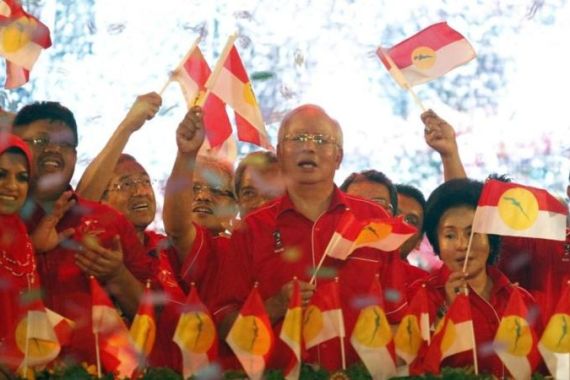The black eye of Malaysian scandal politics
Like the polls themselves, determining whether “scandal fatigue” will manifest at the ballot box is too close to call.

Kuala Lumpur, Malaysia – Most countries, if not all, have had a dose of political intrigue, a few lofty falls from grace, or the embarrassing blunders of elected officials.
Yet even by this measure, the recent history of Malaysia has been utterly over the top.
The tight general elections set for Sunday have undoubtedly been influenced by the culture of scandal that has permeated domestic politics, but the outcome could determine if Malaysia is past all that or if it will sink deeper into the cross-fire of tabloid-style sleaze.
The two main players heading into the polls, one of whom will surely be the next leader of Malaysia, have hardly been immune, or averse, to political hardball.
Najib Razak, the prime minister, has vehemently denied links to the 2006 murder of a female Mongolian translator who was shot twice before her corpse was obliterated with C4 explosives in an abandoned field outside Kuala Lumpur.
Bone fragments linked the killing to two members of an elite police squad who have been described as Najib’s former bodyguards. Both were sentenced to death by hanging.
The incident has been back in public re-play mode since March when a private investigator, who gave sworn testimony that placed Najib with the woman at a café in France, died of a heart attack. Najib took a public oath at a mosque to declare that he never met her.
His opponents, as could be expected, made pubic calls to re-open the case.
‘Scandal fatigue’
Anwar Ibrahim, the opposition leader trying to unseat Najib, has been dragged through public ignominy like few men in modern times.
After falling out with the formidable Dr Mahatir Mohammed, his boss and prime minster from 1981 to 2004, the married father of five was accused of having a homosexual affair with his wife’s driver and convicted of sodomy, a crime in Islamic Malaysia.
While in jail, he was beaten up by the chief of police and appeared in court with a face wound, sparking international outcry.
Anwar served six years, winning an appeal in 2004. After a rousing return to politics in 2008, one of his aides filed a police report again accusing him of sodomy. After a two-year court case he was acquitted. He was allegedly pictured in a sex tape that was leaked in 2011.
Many analysts and everyday Malaysians, however, are beginning to yawn at the ever-present imbroglios. Like the polls themselves, determining whether “scandal fatigue” will manifest at the ballot box is still too close to call.
“These allegations of sex and innuendo have got to stop,” said Sankara Nair, a lawyer who has defended Anwar.
“It’s almost as if they think if they say it often enough then it will be true.”
‘Black eye’
As it stands, the nation has endured more than a decade of ugly incidents so highly publicised and seemingly partisan in nature, it’s hard for the outsider to imagine Malaysian politics without them.
The barrage of slander, seedy sex tapes, and archaic accusations have, at times, breached the boundaries of acceptable conversation. To some observers, the impact to public trust, political credibility and national stature, is likewise unspeakable.
“It makes us look very bad. It looks like we have nothing better to do than get involved with such things,” said AB Shamsul, founding director of the Institute of Ethnic Studies at the University Kebangsaan Malaysia.
We are seeing a very interesting phenomenon. Malaysians are losing confidence in institutions but, at the same time, they are finding faith in themselves.
“For many years, Malaysia politics was all domestic. But after 1998, when Anwar was kicked out [of government], Malaysia news became internationalised. The [sodomy] allegations were the first and most dramatic introduction the world had to Malaysia.
“We got a black eye just as much as Anwar did,” said Shamsul, referring to Anwar’s court appearance.
The long list of scandals isn’t all about sex. Accusations of kick-backs, race-baiting, vote-buying and outright copying of rival platforms are all part of the mix. Members of parties in both of the rival coalitions have been embroiled.
Cynicism to enthusiasm
Tian Chua, vice president of the opposition Keadilan party, says scandals and tit-for-tat accusations are “losing steam”.
“The [ruling coalition] is still playing on sex scandals and Chinese taking over the country. In the modern day, it’s seldom that a ruling party does this kind of thing; fringe party, yes, but not a ruling one,” Chua told Al Jazeera.
“I think people are sick of it [the sex tapes]. There are a lot more exciting things to be talking about than these sorts of scandals.”
Other analysts see a silver lining in the current situation. Chin-Huat Wong, a political scientist and fellow at the Penang Institute, a think-tank funded by Penang state government, said many voters are choosing non-partisanship to help maintain that the elections are conducted fairly.
“We are seeing a very interesting phenomenon. Malaysians are losing confidence in institutions but, at the same time, they are finding faith in themselves. [It has] never before [happened] in our history; non-partisans are moving politics forward,” Wong said.
“They feel anger, not fatigue, of what is wrong in this country. It’s those who don’t take part who may feel fatigue. The good news is more and more Malaysians are turning from cynicism to enthusiasm, from ranting to action.”